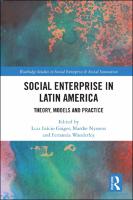Social Enterprise in Latin America
Proposal review
Theory, Models and Practice
| dc.contributor.editor | Gaiger, Luiz Inácio | |
| dc.contributor.editor | Nyssens, Marthe | |
| dc.contributor.editor | Wanderley, Fernanda | |
| dc.date.accessioned | 2022-07-22T12:07:53Z | |
| dc.date.available | 2022-07-22T12:07:53Z | |
| dc.date.issued | 2019 | |
| dc.identifier | ONIX_20220722_9780429621758_30 | |
| dc.identifier | OCN: 1120069589 | |
| dc.identifier.uri | https://library.oapen.org/handle/20.500.12657/57598 | |
| dc.description.abstract | In the absence of a widely accepted and common definition of social enterprise (SE), a large research project, the "International Comparative Social Enterprise Models" (ICSEM) Project, was carried out over a five-year period; it involved more than 200 researchers from 55 countries and relied on bottom-up approaches to capture the SE phenomenon. This strategy made it possible to take into account and give legitimacy to locally embedded approaches, thus resulting in an analysis encompassing a wide diversity of social enterprises, while simultaneously allowing for the identification of major SE models to delineate the field on common grounds at the international level. These SE models reveal or confirm an overall trend towards new ways of sharing the responsibility for the common good in today’s economies and societies. We tend to consider as good news the fact that social enterprises actually stem from all parts of the economy. Indeed, societies are facing many complex challenges at all levels, from the local to the global level. The diversity and internal variety of SE models are a sign of a broadly shared willingness to develop appropriate although sometimes embryonic—responses to these challenges, on the basis of innovative economic/business models driven by a social mission. In spite of their weaknesses, social enterprises may be seen as advocates for and vehicles of the general interest across the whole economy. Of course, the debate about privatisation, deregulation and globalised market competition—all factors that may hinder efforts in the search for the common good–has to be addressed as well. The second of a series of four ICSEM books, Social Enterprise in Latin America will serve as a key reference and resource for teachers, researchers, students, experts, policy makers, journalists and other categories of people who want to acquire a broad understanding of the phenomena of social enterprise and social entrepreneurship as they emerge and develop across the world. | |
| dc.language | English | |
| dc.relation.ispartofseries | Routledge Studies in Social Enterprise & Social Innovation | |
| dc.subject.classification | thema EDItEUR::K Economics, Finance, Business and Management::KJ Business and Management::KJH Entrepreneurship / Start-ups | en_US |
| dc.subject.classification | thema EDItEUR::K Economics, Finance, Business and Management::KC Economics::KCM Development economics and emerging economies | en_US |
| dc.subject.classification | thema EDItEUR::K Economics, Finance, Business and Management::KJ Business and Management | en_US |
| dc.subject.other | Argentina | |
| dc.subject.other | Bolivia | |
| dc.subject.other | Brazil | |
| dc.subject.other | Chile | |
| dc.subject.other | Development Economics | |
| dc.subject.other | Ecuador | |
| dc.subject.other | Entrepreneurship | |
| dc.subject.other | Innovation Management | |
| dc.subject.other | Latin America | |
| dc.subject.other | Mexico | |
| dc.subject.other | Non-profit Organisation | |
| dc.subject.other | Non-profit Sector Management | |
| dc.subject.other | Peru | |
| dc.subject.other | Social Enterprise | |
| dc.subject.other | Social Entrepreneurship | |
| dc.subject.other | Social Innovation | |
| dc.subject.other | Social Policy | |
| dc.subject.other | South America | |
| dc.title | Social Enterprise in Latin America | |
| dc.title.alternative | Theory, Models and Practice | |
| dc.type | book | |
| oapen.identifier.doi | 10.4324/9780429055164 | |
| oapen.relation.isPublishedBy | 7b3c7b10-5b1e-40b3-860e-c6dd5197f0bb | |
| oapen.relation.isbn | 9780429621758 | |
| oapen.relation.isbn | 9780367151195 | |
| oapen.relation.isbn | 9780367675714 | |
| oapen.relation.isbn | 9780429055164 | |
| oapen.imprint | Routledge | |
| oapen.pages | 330 | |
| peerreview.anonymity | Single-anonymised | |
| peerreview.id | bc80075c-96cc-4740-a9f3-a234bc2598f1 | |
| peerreview.open.review | No | |
| peerreview.publish.responsibility | Publisher | |
| peerreview.review.stage | Pre-publication | |
| peerreview.review.type | Proposal | |
| peerreview.reviewer.type | Internal editor | |
| peerreview.reviewer.type | External peer reviewer | |
| peerreview.title | Proposal review | |
| oapen.review.comments | Taylor & Francis open access titles are reviewed as a minimum at proposal stage by at least two external peer reviewers and an internal editor (additional reviews may be sought and additional content reviewed as required). |

